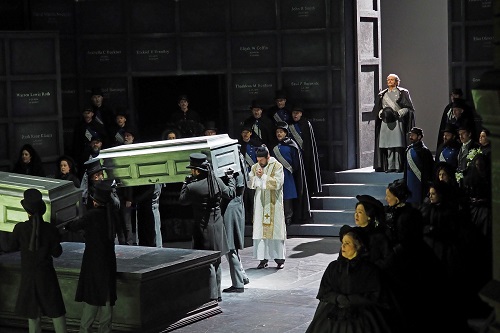 Spain Gounod, Roméo et Juliette: Liceu Orchestra and Chorus / Josep Pons (conductor), Gran Teatre del Liceu, Barcelona, 22.2.2018. (JMI)
Spain Gounod, Roméo et Juliette: Liceu Orchestra and Chorus / Josep Pons (conductor), Gran Teatre del Liceu, Barcelona, 22.2.2018. (JMI)

Cast:
Roméo – Saimir Pirgu
Juliette – Aida Garifullina
Frère Laurent – Nicola Ulivieri
Capulet – Rubén Amoretti
Mercutio – Gabriel Bermúdez
Stéphano – Tara Erraught
Tybalt – David Alegret
Grégorio – Germán Olvera
Le Duc – Stefano Palatchi
Paris – Isaac Galán
Benvolio – Beñat Egiarte
Frère Jean – Dimitar Darlev
Co-production: Liceu and Opera Santa Fe
Director – Stephen Lawless
Sets and Costumes – Ashley Martin Davis
Lighting – Mimi Jordan Sherin
It is almost 33 years since this opera was last produced at the Liceu. On that occasion, Alfredo Kraus, perhaps the greatest Roméo in history, sang the part. Obviously, it would be hard to match the artistic and, especially, the vocal results of that performance, and this production did fall rather short.
The staging is by Stephen Lawless, and it was unconvincing. The sets, which do not change during the five acts of the opera, consist of a semicircle that represents a mausoleum and bears the names of those buried inside. This works in the prologue, which is a flashback, but it takes a lot of imagination to understand that we are in the Palace of the Capulets or Juliette’s garden, not to mention the church (a hospital here) of Frère Laurent and, later on, the Piazza di Verona or Juliette’s room. The last act makes more sense since the heroine has been entombed, although it is strange to see members of both families enter the mausoleum and attend, with their weapons, the final duet of the two unfortunate lovers.
The action has been moved to the 1860s and the American Civil War: we go from Shakespeare’s time to that of Charles Gounod. The direction is not particularly bright, and the crowd’s movements are uninspired.
The greatest merit in having Josep Pons in charge of the musical direction in recent years has been the significant improvement in the quality of the Liceu’s orchestra. However, his reading here was rather routine: it lacked inspiration and nuance. The orchestra was good under his baton, but the chorus was not. If the orchestra is improving, you can almost say the opposite about the chorus.
The role of Roméo was sung by Saimir Pirgu who has an attractive voice, but one that falls short on projection. The truth is that I expected more from him in terms both of singing and interpretation.
Soprano Aida Garifullina as Juliette was credible on stage, but her voice is too light for the character, especially in the second part of the opera. There is a certain shortage of colours in her voice, which makes her vocal performance somewhat monotonous.
Frère Laurent was played by bass-baritone Nicola Ulivieri, who did well, although I prefer a true bass in the character; he sounded a bit short in the lower part of the tessitura. Rubén Amoretti as Monsieur Capulet also did well, although his voice on this occasion was not as strong as usual. I expect that being on such an open stage takes its toll on voice projection.
Gabriel Bermúdez was a correct Mercutio, while mezzo-soprano Tara Erraught was a brilliant Stéphano, although ill-treated by the stage production. David Alegret made a persuasive Tybalt though his voice is perhaps too light for the part. Germán Olvera was sonorous as Grégorio, and Stefano Palatchi was good as the Duke of Verona.
José M. Irurzun